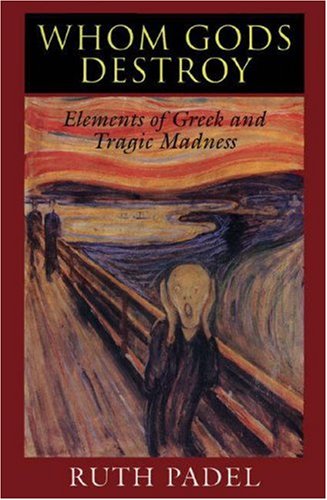
Ruth Padel
Whom Gods Destroy
‘Lively, provocative, with a stunning breadth of reference, expanding beyond the Greeks to recent times.’ The Times
‘Thrillingly learned, vibrant, and visionary, Ruth Padel’s fascinating new book shows brilliantly how the Greek playwrights revised and re-shaped their linguistic and intellectual inheritance to fit the context of an inchoate “scientific” revolution.’ Financial Times
Why is there so much madness in tragedy? Why was Dionysus the god of tragedy? How different were ancient conceptions of madness and personality from ours? How does that affect our responses to Greek plays?
This book, published 1995, follows In and Out of the Mind in addressing both the general reader, and students or scholars of literature, poetry, history of ideas, classics and psychoanalysis. It explores ideas of madness in tragedy, both in ancient Greece and the Renaissance, including Shakespeare, the difference Freud made to our ideas of madness, and the historical problems involved in psychoanalytic interpretations of feelings and motivation in ancient tragedy.
Ruth begins by tracing the saying, “Those whom gods wish to destroy, they first make mad”. She explores the Greek language of madness and ideas of inner darkness, and moves on the afterlife of these ideas in the ‘black sun’ of Renaissance and Romantic melancholia, Christian ideas of ‘folly,’R D Laing’s argument that the mad ‘see’ more truly than the sane; madness as inner and outer “wandering”; as pollution, disease, damage, and a sign of divine displeasure. She goes on to relate ancient madness to the multiple divinities of the Greek world, to schizophrenia, Gregory Bateson’s concept of double bind, and the ways in which tragedy, whether in ancient Greece, Racine, Shakespeare or today, reveals a knowledge which ‘is sad to have to know’.
From reviews:
‘Thrillingly learned, vibrant, and visionary, Ruth Padel’s fascinating new book shows brilliantly how the Greek playwrights revised and re-shaped their linguistic and intellectual inheritance to fit the context of an inchoate “scientific” revolution,’ Financial Times
‘This roller-coasting study, storming its way from madness in Greek tragedy to madness today, helps us identify the thin and shifting line between what is believed to be mad and what sane, and how both feed on each other. Padel’s pellucid sentences have the urgency of a commentary on the Grand National,’ Scotland on Sunday
‘Flashing similes, imagery and wit,’ Independent on Sunday
‘Lively, provocative, with a stunning breadth of reference, expanding beyond the Greeks to recent times,’ The Times
‘A stunning scholarly book: nt one cliché, no jargon, every sentence a delight. Simply and brilliantly, Ruth Padel lays bare insights which theorists strive after but obscure with abstraction, showing how our own grammar of madness has its long and gnarled roots in Greek tragedy. She shows are radically different concepts of madness are at different times and in different cultures. Her book is a subtle assault on naive notions of truth and reality,’ Udi Eichler, psychotherapist and TV producer, Hampstead and Highgate Express
‘Suggestive, exhilarating, and wide-ranging.’ Telegraph
‘Suggestive and tantalizing. She illuminates Greek writers by invoking modern thought, but also rebukes and extends the narrowness of modern thought by emphasizing the evidence of literature, and specifically tragedy.’ Spectator
